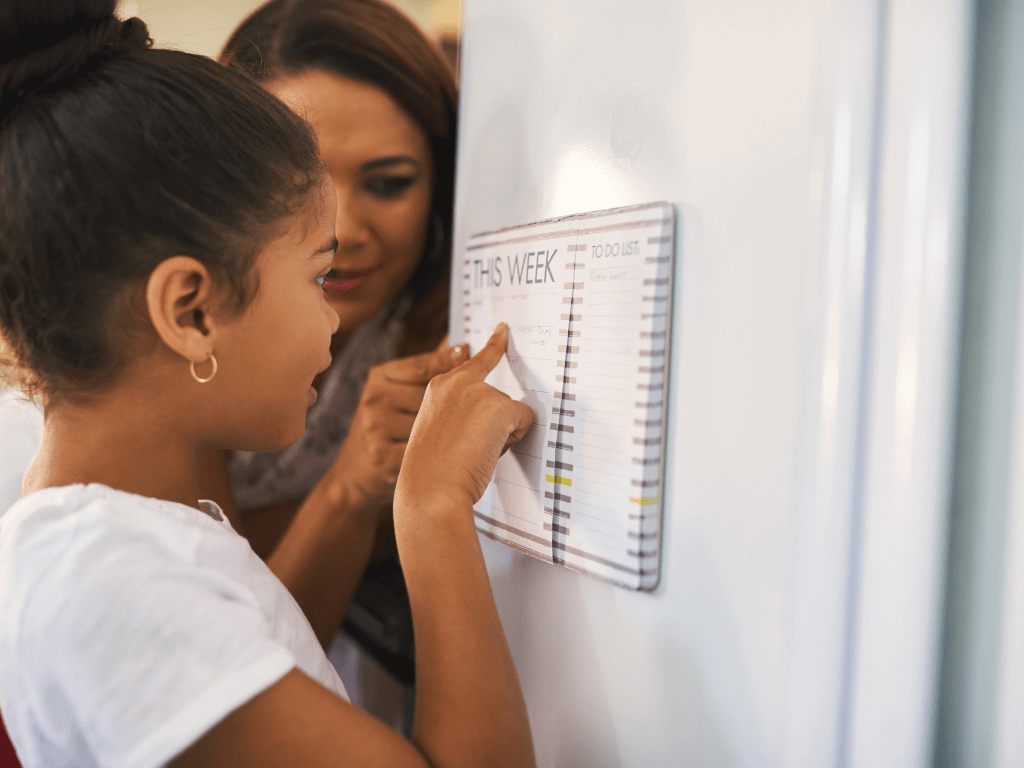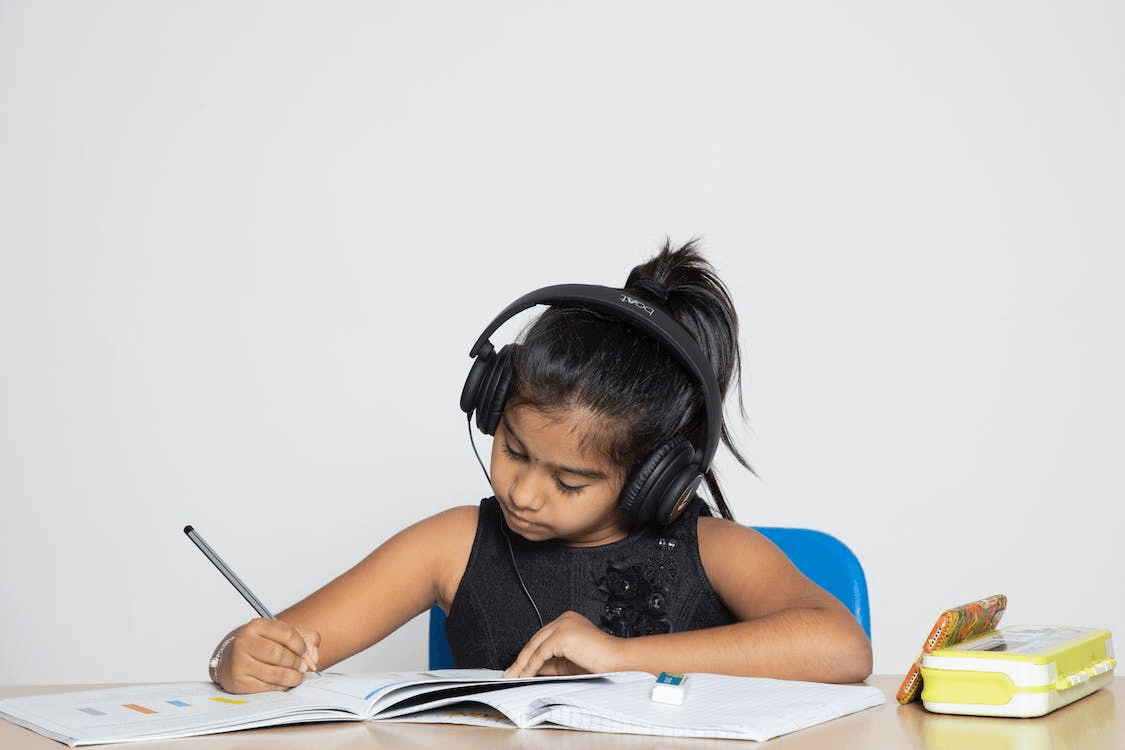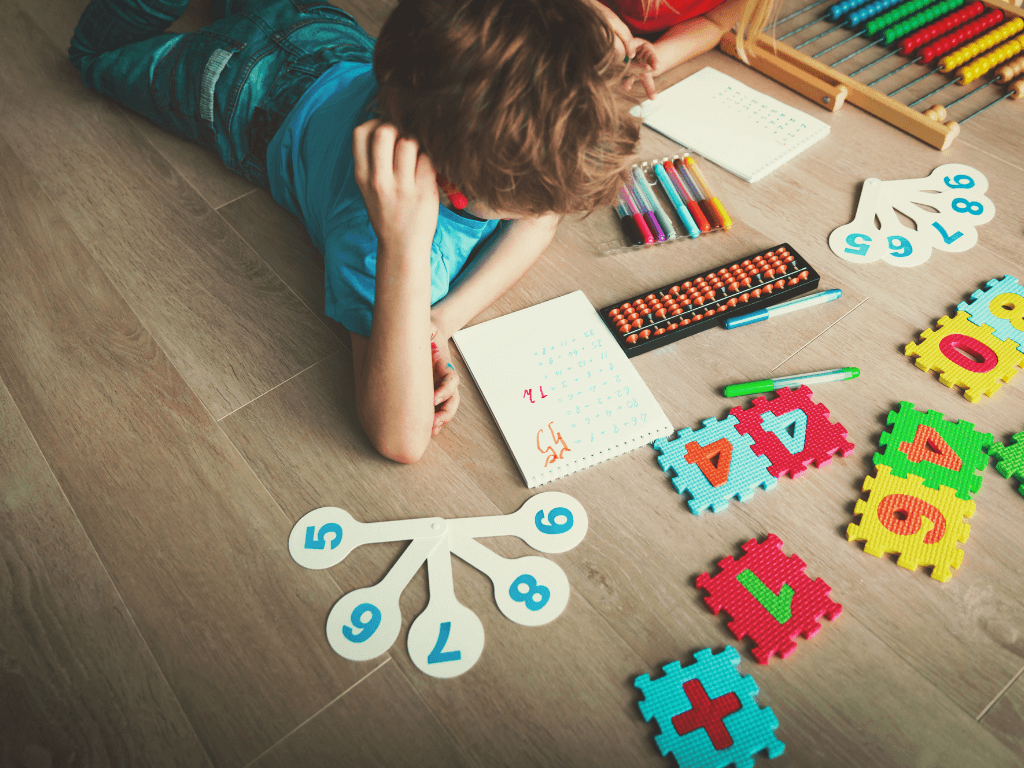8 homework tips for parents of kids with ADHD or autism
Keep your nerve this school year with neurodivergent-friendly strategies.

ADHD and autism affect every area of someone’s life, and getting homework done is no exception. Difficulties with finishing tasks, focus problems, zoning out and missing instructions, impatience, and fidgeting are all factors that can hinder their ability to complete assignments.
ADHD and autism spectrum disorder (ASD) are developmental conditions caused by literal differences in the brain. Autistic people, in particular, are likely to display repetitive behaviors and have specific interests. This means they need customized learning approaches to help absorb and remember information.
Helping a child with ADHD or ASD complete their homework can be daunting. That's why we made this guide packed with top tips to make homework more interesting and engaging.
Let's delve into it and discover effective strategies together!

Too long; didn't read
- Navigating homework with neurodivergent kids can be difficult due to neurodevelopmental differences.
- Taking your child's individual needs into account can help promote learning and even make homework an exciting part of the day.
- Incorporating their interests , creating a routine , and implementing a reward system are just three of the eight strategies explored below.
- Every child is different: Try what works for your kid and don't be afraid to adapt things as needed.
Our top homework strategies for children with ADHD and autism
1. break down tasks to their smallest possible steps..

Great for kids who struggle with:
- Focus and attention
- Organization
- Task completion
- Executive dysfunction
- Attention to detail
Just as you had to help take literal baby steps, you’ll also have to help them take small steps for their homework. Progress visualization can make homework more manageable for your child. Create a timeline or break down the tasks into smaller chunks and add them to a checklist.
Not to mention, finishing tasks provides a dopamine rush , giving us a feeling of accomplishment after crossing one off our list.
So, completing multiple small tasks should make your child feel proud of themselves as they work, which will (hopefully) keep them motivated to stay on top of their assignments.
2. Create a new routine (and stick to it.)

- Task-switching or transitions
- Time management
- Anxiety or uncertainty
Adding routine to the day can especially help autistic kids , as children with ASD often prefer repetition. Creating structure with a set wake-up time and morning routine paired with devoted time for homework could help reduce stress.
For ADHDers, routine helps children focus on daily tasks under the guidance of a parent or caregiver. Coupled with positive reinforcement after completing everyday tasks, this can be a powerful coping mechanism for them.
3. Incorporate your child’s interests.

- Hyperfocus or hyperfixations
A notable trait of autism involves the tendency to develop particular and intense interests. Capitalize on these interests and incorporate them into homework whenever possible.
For example, if your child is fascinated by space , consider using space-related examples in math problems.
This essentially transforms their "boring homework" into something exciting and engaging , catering to their unique interests and fostering a more enjoyable learning experience.
4. Use a reward system.

- Procrastination
- Task avoidance
- Task initiation and completion
Children (and adults, if we're being honest) with ADHD thrive on immediate feedback. Implementing a rewards system for homework completion can give this feedback and motivate them to stay on task.
Remember: Rewards don't always have to be physical objects! Here are a few examples of rewards you can give your child for completing a task for their homework:
- Extra free time
- Verbal praise (”I am so proud of you!”)
- Family game night
- Favorite activity, like going for a bike ride around the neighborhood
- Later bedtime
- Picking a movie for movie night
- Choosing what’s for dinner
Remember to keep rewards small and achievable to maintain their motivation.
5. Add movement breaks.
- Sensory processing
- Distractibility and focus
- Hyperactivity, fidgeting, or restlessness
- Impulsivity
Engaging in exercise and movement can improve cognitive function in people with ADHD. 1 If your child loses interest in homework , movement breaks can help re-stimulate them.
Set a timer for around 3-4 minutes and let your child enjoy some movement before returning to their task refreshed.
6. Offer sensory support.

- Overstimulation
- Understimulation
- Meltdowns or sensory overload
- Focus ( specifically if music is playing in the background ) 2
ADHDers and autistic people can be overstimulated by sounds and textures that neurotypical people may not even notice. 3,4 They may also experience understimulation and react slowly in situations where others might respond quickly.
Sensory support introduces sensory stimuli into tasks or routines to help kids become less - or more - stimulated, depending on their specific needs. As a result, they can focus better on tasks like their homework.
Create a sensory space in your home depending on your child’s specific sensory needs. This can contain items like wobble cushions, bean bags, or sensory boxes to help with focus during movement breaks.
For children who struggle with overstimulation , a quiet space with a weighted blanket and earplugs can bring stability. 5
7. Use visual aids.

- Abstract ideas and abstract thinking
- Math or dyscalculia
- Processing information in a specific order
- Problem-solving
- Word problems and riddles
Visual aids offer a hands-on approach to help us associate complex information with simpler representations.
Helpful visual aid examples
- Colorful objects to represent addition and subtraction formulas in math or colorful liquid to measure liquid volumes.
- Working on mind maps together
- Using different colored pens to help break down large concepts or to represent information in an alternative way
💡 Pro tip! Use familiar objects. This will make it easier for them to recall the information when necessary.
8. Use technology.

- Sensory sensitivities
Technology can make homework more interactive and engaging ; just be mindful of screen time limits.
For example, you can use interactive online software to make homework and learning more interactive. (The Inflow editors really like Miro !)
There are also online learning tools designed with bold and colorful visual elements to present information in an engaging way. (See Khan Academy and BBC Bitesize .)
Final thoughts
While the suggestions provided here are helpful for many children, remember that every child is different. Find what motivates and engages your child. It may take time, but effective communication between you and your child can help find techniques that work and relieve their homework-related stress.
1 Child Neuropsychology | A trial-by-trial analysis reveals more intense physical activity is associated with better cognitive control performance in attention-deficit/hyperactivity disorder (2016) 2 Music Therapy Perspectives | Does Music Matter? The Effects of Background Music on Verbal Expression and Engagement in Children with Autism Spectrum Disorders (2016) 3 Brain Sciences | Network-Based Differences in Top–Down Multisensory Integration between Adult ADHD and Healthy Controls—A Diffusion MRI Study (2023) 4 Brain Sciences | Ayres Theories of Autism and Sensory Integration Revisited: What Contemporary Neuroscience Has to Say (2019) 5 Asian Journal of Behavioural Studies | The Effects of Sensory Design on Autistic Children (2018)
Your voice matters!
Zain is a researcher and freelance journalist focusing on topics like Islamophobia, racism, and disarmament issu...
Related articles

Is ADHD taking a toll on your marriage? What to look for and how to fix it.

ADHD in students grade 6-12: 6 subtle signs to watch for
.jpg)
Looking for support?
Inflow can help you thrive with ADHD and reach your full potential. Start your journey now by taking our quiz.
Related articles:

5 signs your K-5 student might have ADHD (an age-appropriate guide)

AWARD-WINNING BLOG
5 strategies to make homework easier for adhd kids (and parents).

Home work. Those two words seem mismatched.
Home is where you can chill, be yourself, and get a little break from “work.”
Coming home from their 30-hour a week "job," many children crave down time. They want a break from "work" – from being "on" or putting effort into paying attention for six hours!
So who can blame kids for not wanting to do their homework ?
As parents, we understand that homework reinforces lessons learned from the school day. Revisiting material and practicing skills is fruitful. However, if you have a child (or more), you probably have stories that prove otherwise. Especially with screens as part of the equation.
Attention-challenged children struggle because of problems unrelated to the specific homework assignment:
- Dis tracted by the internet
- Dis enchanted with the topic
- Dis engaged during the lesson at school
- Dis mayed by how long it takes to answer a single question
- Dis combobulated from trying to categorize what is most important
Homework also assumes that all children have stay-at-home moms who are “on call” to help – which is not exactly true in this day and age!
Since our smart but scattered children aren't naturally supplied with minds that can keep track of due dates and directions, here are some homework strategies to ease the challenges ADHD kids face. But remember – the most important thing you can do to help your child, by far, is to notice what she or he does well, and encourage it.
Article continues below...
Want to stop school struggles.

Download a free tipsheet "10 Parenting Tips for School Success" to stop constant challenges at school and at home!
Here are 5 homework strategies for ADHD kids to get you started:
- Right after school or later ?
- Broken into time segments?
- With or without music?
- At a desk or the kitchen counter?
- Allow them to change it up from day to day
Foster Independence
Around 5th grade, a major goal can be independence with homework. From start to finish, the parent should assist – not nag to completion. You can gradually help your child less and less, and still expect high quality work.
- Note: this may be delayed for many kids with Executive Function challenges
- From start to finish, the parent should assist – not nag to completion.
- Gradually help less and less, and still expect high quality work.
- Goal: Only help when your child asks for it.
- Remember that it's their work – not yours.
- Digital post-it notes for work for some students – they see them on their desktop when they arrive at the screen.
- Reward for independently using processes and organization strategies, sticking to a time schedule, and being focused on online resources (rather than Youtube, etc.).
Visual Charts
- Calendars or bulleted lists help enormously. Student planners and online calendars tend to be "out of sight and out of mind."
- Large white boards are great, ideally one for each child.
- Designate a special place on the wall for it. Use it to make charts that track homework topics or nightly reading.
- Use abbreviations and humor to simplify and keep your child's attention.
- Boxes on the chart can also list homework assignments.
- Have your child write estimates for how long they should take to finish.
- It's beneficial to an ADD mind to track time elapsing. After the work is done, write down how long it actually took to track time management.
Physical Space
- Comfortable, flat surface
- Well-lit from above
- Not too far from the printer, if a middle or high schooler
- Quiet (except possible headphones)
- Free from distraction
- Stocked with needed materials
- Fidgets that help focus (not distract)
Paperwork – Breathe, and Scan Everything!
- Keeping track of the endless reading logs, rubrics, drafts, and study sheets seems impossible!
- Maintaining their original condition is even more difficult. This is where technology is your friend.
- Teachers who post documents on their websites are saviors. Scan any blank reading logs or assignments to keep on record at home.
- It also helps to color code folders and notebooks for some children.
More From ADHD Blog

Privacy Overview
| Cookie | Duration | Description |
|---|---|---|
| cookielawinfo-checkbox-analytics | 11 months | This cookie is set by GDPR Cookie Consent plugin. The cookie is used to store the user consent for the cookies in the category "Analytics". |
| cookielawinfo-checkbox-functional | 11 months | The cookie is set by GDPR cookie consent to record the user consent for the cookies in the category "Functional". |
| cookielawinfo-checkbox-necessary | 11 months | This cookie is set by GDPR Cookie Consent plugin. The cookies is used to store the user consent for the cookies in the category "Necessary". |
| cookielawinfo-checkbox-others | 11 months | This cookie is set by GDPR Cookie Consent plugin. The cookie is used to store the user consent for the cookies in the category "Other. |
| cookielawinfo-checkbox-performance | 11 months | This cookie is set by GDPR Cookie Consent plugin. The cookie is used to store the user consent for the cookies in the category "Performance". |
| viewed_cookie_policy | 11 months | The cookie is set by the GDPR Cookie Consent plugin and is used to store whether or not user has consented to the use of cookies. It does not store any personal data. |
Internet Explorer is no longer supported
Please upgrade to Microsoft Edge , Google Chrome , or Firefox .
Lo sentimos, la página que usted busca no se ha podido encontrar. Puede intentar su búsqueda de nuevo o visitar la lista de temas populares.
Get this as a PDF
Enter email to download and get news and resources in your inbox.
Share this on social
Complete guide to adhd, what's in this guide.
Children with attention-deficit hyperactivity disorder (ADHD) find it unusually difficult to concentrate on tasks, to pay attention, to sit still, and to control impulsive behavior. This guide offers parents the information you need to understand the behaviors associated with the disorder and make effective decisions for your child about symptoms, diagnosis, and treatment.
What Is ADHD?
Attention-deficit hyperactivity disorder, or ADHD, is a condition that makes it unusually difficult for children to concentrate, to pay attention, to sit still, to follow directions, and to control impulsive behavior. While all young children are at times distractible, restless, and oblivious to parents’ and teachers’ instructions, kids with ADHD behave this way much more often than other children their age. And their inability to settle down, focus, and follow through on tasks in age-appropriate ways makes it very hard for them to do what’s expected of them at school. It can also lead to conflict at home and difficulty getting along with peers.
ADHD Symptoms
Symptoms of ADHD are divided into two groups: inattentive behaviors and hyperactive and impulsive behaviors .
Inattentive symptoms of ADHD:
- Makes careless mistakes
- Is easily distracted
- Doesn’t seem to be listening when spoken to directly
- Has difficulty following instructions
- Has trouble organizing
- Avoids or dislikes sustained effort
- Is forgetful, always losing things
Hyperactive or impulsive symptoms of ADHD:
- Fidgeting or squirming, trouble staying in one place or waiting his turn
- Excessive running and climbing
- Trouble playing quietly
- Extreme impatience
- Always seems to be “on the go” or “driven by a motor”
- Excessive talking or interrupting, blurting out answers
Some children exhibit only the first group ADHD of symptoms, and some exhibit only the latter. But the majority of those with an ADHD diagnosis have a combination of both, which can make it very difficult for them to function in school, and in other activities, and can create a lot of conflict at home.
How Are ADD and ADHD Different?
ADD, or attention-deficit disorder, is an older term for the disorder we now call ADHD, or attention-deficit hyperactivity disorder. It was called ADD up until 1987, when the word “hyperactivity” was added. Some people still use the old term, ADD, out of habit, or because it’s a more familiar term than ADHD. Some use it to refer to kids with ADHD who aren’t hyperactive.
Can a Child Who’s Not Hyperactive Have ADHD?
Yes. Kids who have trouble focusing but are not unusually restless or impulsive have a more inattentive type ADHD. They tend to be diagnosed later because they are less prone to disruptive or problematic behavior that comes to the attention of teachers and parents. But kids who have inattentive symptoms may start to struggle in the middle of elementary school, when it becomes increasingly difficult for them to keep up.
Why Can Kids With ADHD Concentrate on Some Things? What Is ADHD Hyperfocus?
While ADHD is called an attention deficit disorder, experts say what’s really disordered is the child’s ability to control and direct what he’s paying attention to. So many kids with ADHD are perfectly capable of intense focus on things that are very exciting to them, like video games, but they can’t maintain that kind of focus on things that aren’t immediately rewarding, like schoolwork or putting on their shoes or going to bed.
That intense concentration, sometimes called hyperfocus, is also the reason kids with ADHD often get upset when asked to stop doing something they are engaged in, like a favorite activity at school or playing a video game. They have what experts call an inability to “attention switch,” which can cause a lot of conflicts with adults.
And speaking of video games: Because they are constantly stimulating and rewarding, experts say they can induce a kind of trance state in a child who has trouble regulating her attention. In that case, it’s less a matter of hyperfocus than what one calls “screen suck.”
What Is Executive Functioning?
Executive functions are the self-regulating skills that we all use to accomplish tasks, from getting dressed to doing homework. They include:
- Organizing time and materials
- Making decisions
- Shifting from one situation to another
- Controlling emotions
- Learning from past mistakes
Most kids with ADHD have deficits in some executive functions, though not all children with executive function issues have ADHD.
Does ADHD Affect Kids Outside of School?
Yes. Their inattention and impulsivity also affects their friendships, extra-curricular activities, and family life. They may have trouble making and keeping friends because they interrupt constantly, and are prone to blowing up when they don’t get their way. It’s not uncommon for children with severe ADHD to be blackballed from playdates because they can’t be counted on to behave. Kids with ADHD may have trouble playing on teams because they find it hard to focus and follow the rules.
At home, they may find themselves on a collision course with parents and siblings because they don’t follow instruction, are impulsive, and melt down when they are asked to transition from some activity they enjoy to mealtime, homework time, or bedtime.
By the time kids with ADHD reach adolescence, their impulsivity can be dangerous, making them prone to car accidents, unsafe sex, and other risky behaviors.
Why Are Kids With ADHD Often Defiant or Demonstrate Disruptive Behavior?
Defiance and emotional outbursts are very common in kids with ADHD, though they are not, themselves, symptoms of ADHD.
Kids who have ADHD tend to become defiant when they are expected to do things that are hard for them, especially when it means stopping something that’s pleasurable—like playing a video game. So things like homework, going to bed, getting dressed, and coming to dinner can become battlegrounds. These situations are difficult for them to tolerate because of inherit deficits in paying attention, tolerating a boring situation, reining in impulses, transitioning from a fun activity, and controlling their activity level. Since these situations are really challenging for them, they may try to avoid them. Unfortunately when it comes to ADHD parenting, the avoidance strategies that these kids typically use are disruptive behavior, tantrums, arguing, defiance, and power struggles.
Can You Grow Out of ADHD?
ADHD symptoms change as children get older, and it’s estimated that about a third of children who are diagnosed with the attention-deficit hyperactivity disorder will no longer meet the criteria by the time they reach young adulthood.
In general, hyperactivity declines as kids move through elementary school, and inattention becomes the primary problem for them as the schoolwork they are expected to do becomes more demanding and their parents and teachers are not so closely supervising their activities. In adolescence, impulsivity also becomes a big concern, as it leads to car accidents, unsafe sex, and other risky behavior.
Children who are most likely to have ADHD that continues into adulthood are those whose symptoms are very severe in childhood, and those who also have another psychiatric disorder, like depression or anxiety.
ADHD Diagnosis
When is ADHD diagnosed? Because the symptoms of ADHD can also be the result of other issues, such as anxiety, depression, or trauma, a professional diagnosing your child should carefully rule out other possible reasons for his behavior.
A child should receive an ADHD diagnosis only if he exhibits a variety of inattentive or impulsive behaviors
- At a level that is abnormal for children his age
- Over an extended period
- In more than one setting—both at home and at school, for instance.
- These behaviors must also be interfering significantly with schoolwork or social interaction.
How is an ADHD diagnosis done? To make an accurate diagnosis, a clinician should collect information from several people who have observed your child, including you, other caregivers, and teachers.
Parents and teachers should be asked to fill out a rating scale, such as the SNAP, the Child Behavior Checklist, or Connor’s Checklist, to capture an accurate assessment of the frequency of symptoms over a period of time. A child may be given a test called a Continuous Performance Test, which rates her ability to complete a repetitive task over a period of time and can give a more complex picture of her ADHD symptoms.
A child should not be diagnosed with ADHD just based on a parent’s or teacher’s report that she is overly active or distracted.
Who can diagnose ADHD? ADHD can be diagnosed by any doctor or mental health professional, including:
- Pediatricians
- Psychiatrists
- Clinical psychologists
- Social workers
Many school psychologists are also qualified to diagnose ADHD, but in most cases they’re not authorized by their school districts to do so. Instead, school psychologists will often help identify that a child is showing symptoms of ADHD, determine if their symptoms hinder their school functioning, and make recommendations for needed academic supports. They can also often refer families to an outside mental health professional for the diagnosis.
In the majority of cases, only medical doctors like psychiatrists can prescribe medication to treat ADHD. (Some states allow psychologists to prescribe, and nurse practitioners and physician’s assistants often can, as well.)
The overwhelming majority of ADHD diagnoses are made by pediatricians, though parents should be aware that many pediatricians don’t have advanced training in psychiatric disorders, and an ADHD diagnosis should not be made in a quick office visit, based solely on a report that a child is having trouble concentrating in school. Inattention can be caused by other things, and giving a child ADHD medication won’t address his problems if he doesn’t have ADHD.
ADHD Medication Treatment
What is the most effective ADHD treatment? Research shows that a combined approach of medication and behavioral therapy is the most effective treatment.
For moderate to severe cases of ADHD the first line of treatment is usually medication. ADHD medications called psychostimulants, which increase the amount of certain chemicals in the brain, help children focus and curb impulsivity and hyperactivity.
Behavioral therapies help kids rein in impulsive behavior and be better organized.
What are the kinds of stimulant medications for ADHD? If a child has ADHD, studies show there’s an over 80% chance that he will respond to stimulant medication with a significant reduction in symptoms. There are two main classes of stimulant medications:
- Methylphenidate-based medications Ritalin, Methylin, Concerta, Metadate, Daytrana Patch
- Dextroamphetamine-based medications Adderall, Vyvanse, Dexedrine
Of the children who respond to stimulants, half will respond equally well to both groups of medications, and the other half will respond better to one or the other. There are many different release formulas for stimulant medications, which make them effective for different periods of time.
- Immediate-release formulas are effective for about 4 hours
- Extended-release formulas last as long as 14 hours.
Within the extended-release group, medications vary in the doses they deliver morning and afternoon. Some deliver 50 percent in the first half of the day and 50 percent in the second; others deliver just 30 percent in the first half and 70 percent in the second.
Finding the right dose Since different children metabolize medication in different ways, the goal is to find the formula that delivers an effective dose over a desirable period of time for your child. Getting the right dosage for a particular child takes several weeks of trial. The clinician normally increases the dosage gradually until it becomes effective. If your child experiences undesirable side effects, it may mean that the dosage is too high, or the medication isn’t right for her.
It’s important to note that some children respond differently to the two different stimulants used in these medications—methylphenidate and dextroamphetamine. Changing from one to the other, or even to a different release formula of the same basic medicine, can help reduce or eliminate side effects.
Once an effective dosage is established, your child should be monitored periodically to make sure it’s still meeting her needs as she grows.
Side effects of stimulant medications Stimulant medications can be very effective in reducing symptoms of ADHD, but some kids do experience adverse side effects. They include:
- Sleep issues If medication is interfering with a child’s sleep, it’s because the medication is still active at bedtime. If he’s taking a short-acting formula, it may mean that he is taking a second or third dose too late in the day. If he’s taking medication that lasts 12 or 14 hours, it may help to try one that’s not quite as long-acting. Sleep issues caused by the medication tend to get better over time, so it’s worth giving kids four to six weeks to see if they adjust. Trouble going to sleep may also be caused by kids being too stimulated at bedtime.
- Eating issues Extended-release medicines, which peak about four hours after they’re taken, cause some children to lose their appetite at lunchtime. Some kids can compensate for this by eating a good breakfast before the medication kicks in, and eating well at the end of the day when the medicine is wearing off, at dinner and again before bedtime. Another option is to switch to the immediate-release tablets, which will wear off by lunch.
- Growth issues Some kids, particularly boys, grow more slowly when they’re taking stimulant medication, especially in the first year. But studies show that by the second and third year they catch up. And kids who take weekend breaks and summer vacations from the medication don’t show the slow-down in growth.
- Nausea and headaches These problems tend to dissipate within a few weeks of beginning medication, and can be minimized by taking the medication with food, and in some cases by changing the dosage or schedule.
- Rebound In some cases, after the medication wears off a child becomes irritable and aggressive. We call this “rebound” and it means the medication is leaving the body too quickly. One way to avoid rebound, if it’s a problem, is by adding a smaller dose a half hour before it usually happens, to ease off the medication more gradually. Sometimes, rebound can be a sign that the clinician hasn’t got the right dose yet, or that a different medicine should be tried. Lastly, when a child rebounds, it’s important to consider whether there might be something else going on, like an underlying anxiety or mood issue that comes into play when she comes off her ADHD medicine.
- Tics Some children who take stimulant medication develop tics. When that happens, the first thing your doctor might want to do is try a different stimulant, to see if another medication will work without the tics. If that doesn’t work, the doctor may try a non-stimulant medication, which affects the brain in a different way.
- Mood changes When a stimulant dose is too high for a child he may begin to look sedated or zombie-like, or tearful and irritable. If this happens the dose needs to be reduced. But there is also a small subset of kids with ADHD who seem to get moody and sad or irritable when they take stimulant medications, even at the best possible dose. It usually happens right away, as soon as they start taking the medication, and goes away immediately when they stop taking it. If this happens, your doctor can try switching to a different stimulant, or a non-stimulant medication.
Are there non-stimulant medications for ADHD? There are two types of medications that aren’t stimulants that can help alleviate symptoms of ADHD. They are useful for kids who don’t respond to stimulant medica-tions, or who experience adverse side effects from them.
- Atomoxetine (sold as Strattera) is in a class of drugs called norepinephrine reuptake inhibitors. Norepinephrine is a natural substance in the brain that is needed to control behavior.
- Clonidine (Catapres, Nexicon) and guanfacine (Tenex) are called alpha-adrenergic agonists. These medications were developed to lower high blood pressure, but at the doses given to kids for ADHD they rarely affect blood pressure.Both clonidine and guanfacine come in a 24-hour-release version (Kapvay and Intuniv), and they are sometimes used to treat tics.
Finally, omega fatty acids can also be helpful for ADHD, though not as helpful as stimulants or these other medications.
Should children stop taking ADHD medication during holidays and the summer? Since children with ADHD don’t need to perform academically during the summer or on extended holidays, parents sometimes seize the opportunity to take kids off their regular medication regimen, especially if they are experiencing side effects. Other parents avoid an interruption, fearing that their children’s behavioral problems will rebound.
One reason to stay with treatment year-round is that ADHD doesn’t only affect a child’s performance in school. During the summer, children still have to get along with family and friends and function effectively in group activities like sports and camp.
However, if you are concerned that taking a stimulant medication may be slowing your child’s growth, a summer break can allow him to catch up. And if you are concerned that he is underweight due to suppressed appetite, a summer without medication can help him put on some pounds.
For more on the pros and cons of a drug holiday, click here .
Stimulant Medication Charts
Behavioral treatment for adhd.
What are the behavioral treatments for ADHD? Behavior therapies do not eliminate the core symptoms of ADHD, but they can be very helpful in teaching children to manage them better. For example, children who have trouble finishing things and staying organized can learn techniques for completing tasks, keeping track of assignments, and getting their schoolwork done.
There’s also a kind of behavior therapy for ADHD called parent training that can help reduce behavior problems that stem from ADHD in children. Parent-child interaction therapy and other forms of parent training teach parents how to work with their kids to cultivate good behaviors while minimizing impulsive or inattentive ones. Stimulated by more positive reinforcement, kids who have been out of control can learn to rein in their behavior and enjoy more rewarding relationships with parents and teachers.
As children get older, they often begin working more one-on-one with clinicians to strengthen their organizational skills and develop effective behavioral plans.
When a child is old enough, cognitive behavioral therapy can help teach her to control her behaviors by understanding how her thoughts and feelings influence them.
For more on behavioral therapy for kids with ADHD click here .
What can we do to help kids strengthen executive functions? To bolster kids with weak skills in these areas, learning specialists teach a mix of specific strategies and alternative learning styles that complement or enhance a child’s particular abilities.
With elementary school children, the educational specialist usually works with parents and kids together, to establish routines and tools to use to get work done successfully and with minimal conflict. For instance:
- Checklists can be useful for anything from getting out of the house on time in the morning to doing homework after school to the bedtime routine. Since the steps necessary for completing a task often aren’t obvious to kids with ADHD, defining them clearly ahead of time, and posting them prominently, makes a task less daunting and more achievable.
- Assigning a time limit for each step, particularly if it is a bigger, longer-term project, helps kids manage their time and avoid underestimating how long it will take to do something.
- Using a planner is essential for kids with ADHD who struggle to remember things like homework assignments.
- A rewards chart at home, as well as at school, can help motivate kids who are easily distracted and struggle to acquire new skills.
For more information on adolescents with ADHD, click here .
Was this guide helpful?
Explore popular topics, subscribe to our newsletters.
" * " indicates required fields
This site is protected by reCAPTCHA and the Google Privacy Policy and Terms of Service apply.

Resources to Help Your Kids Thrive
Sign up to receive new articles, guides, and tips from our clinical experts every week.
Stimulant Medications for Treatment of ADHD Charts
Download Stimulant Medication Guide© charts
These charts, comparing different forms of ADHD medication, were created by Dr. Andrew Adesman of Northwell Health, Inc.
User Agreement
The user agrees to the following:
- Northwell Health (formerly North Shore-LIJ Health System) owns all rights in the original guide or applicable replacement guide.
- The user will not sell or knowingly allow others to sell the original guide or applicable replacement guide.
- The user agrees that he/she will not make any derivative works.
- The user acknowledges that use of the original guide or applicable replacement guide is strictly voluntary and at the user’s sole risk.

Download Charts
If you have read the end user agreement and agree, then click below to download the charts.
- Short-Acting Stimulant Medications
- Long-Acting Stimulant Medications
The latest versions of the Stimulant Medication Guide© and the companion ADHD Medication Guide are available at www.ADHDMedicationGuide.com .

ADHD and Homework: How To Get Kids To Focus
Home » Parent Press » Parenting Hacks » Academics » ADHD and Homework: How To Get Kids To Focus
It’s that time of day again: your child has returned home from school, tossed their backpack on the table, and wandered off to do whatever strikes their fancy. Homework has again gone forgotten. So how do you get kids to focus? It’s no surprise that children with ADHD struggle with homework. All children do! They’re tired after a long day of learning new things and being exposed to a lot of overstimulation. That said, someone has to do the homework eventually, so you need to get your child on track. ADHD and homework do not have to be an impossible combination. We’re here to help you and your child out. Read on to learn all about strategies to help with homework completion (or even getting started) for children with ADHD.
Table of Contents
Help Kids Focus With Reminder Tools
Some children (with or without ADHD) will try to hide their homework or just forget they have it. Children with ADHD often struggle with the idea of consequences, so they may not remember that hiding their homework will result in lower grades, or that if they don’t act on homework soon, they might really forget later
Give Kids the Same Tools You Give Yourself
You probably use a reminder app on your phone or your calendar to keep up with life. Give kids the same ability with an app or paper planner. We recommend going digital, of course. Use screens in a healthy way with Goally – we even provide a distraction-free device so kids can focus on schedules, checklists, and reminders.
Goally | The Tablet for Neurodiverse Kids

Checks and Balances
With so many schools putting schoolwork and grades online, it’s easier than ever for parents to check and make sure that their children actually brought their work home with them. Set a reminder in your own phone to check. If you see homework on your child’s schedule, ask about it. Ask your child about their work. If they claim not to have anything, check online to verify.
Help Kids Focus With Routine
Establishing a consistent schedule for your child’s work is crucial for improving their focus and productivity. Children thrive when they have structured routines , even if they occasionally resist them. The optimal time for your child to do their work may vary depending on their individual needs and preferences.
For some children, it’s beneficial to allow them some downtime after school to unwind. Engaging in physical activities or taking a brief nap can help them recharge before diving into their assignments. If you’ve been encountering challenges with ADHD and homework refusal, try pushing the homework time back by an hour to provide your child with an opportunity to decompress and transition smoothly into their work.
Create a Special Work Area
It’s tough for any kid to focus on their homework when they’re working from home, what with all the tempting distractions nearby. But for children with ADHD, these distractions can feel like a total nightmare. From pets to toys to TVs, anything can steal their attention away from their work in an instant.

To help your child stay on track, consider setting up a designated homework space that’s free of distractions. It doesn’t have to be anything fancy – just a small desk or table with a few supplies will do. This can help your child get into “work mode” and stay focused during homework time.
When choosing a spot for the workstation, aim for somewhere quiet and free of distractions. Loud noises or visual distractions can easily derail your child’s concentration, so try to avoid setting up near windows that face a busy street or playground.
Stay Nearby
It’s always best for parents to stay near their children when they’re doing their homework. For children with ADHD, it’s extra important. First, your child might need help. If your child knows that you’re nearby, they’ll feel more confident calling out to you for help instead of just skipping the homework assignment. When you’re nearby, you can also keep an eye on your child to make sure that they’re staying on-task. If you notice that your child is starting to wander, you can intervene.
Schedule Breaks (if Necessary)
Speaking of intervention, intervening doesn’t mean that you make your child start working again. They do have to finish their homework, but it might be better for them to have a short break if they’ve been struggling for a long time. Taking breaks can increase your child’s focus . If they’re working on something too challenging, a short break can be enough to give them the burst of energy that they need to keep going. We recommend 15 minutes or less of break time. Try to get your child to do something physical, like a brief walk outside or a short game of hopscotch.

Helpful Supplies for Homework Time
All of your child’s supplies should be available to them at their “work station.” But what do they need? First, make sure that they have all standard school supplies. Pencils, crayons, erasers, pens, and anything else that you would have bought for them at the beginning of the year should be nearby.
It’s a good idea to have several labeled document bins or folders where your child can place homework that they’ve finished and homework that they haven’t started yet. This can keep your child more organized. We recommend having a few “extras” that can help your child stay on task. If your child does well with fidget toys, slime, or movement items (like a yoga ball, for example), include those things in the child’s work area.

Using a Reward System
We all know that homework can be a real drag for kids. If you’re trying to keep your child motivated and engaged, consider starting a reward system. After all, let’s face it – homework is just plain boring! One effective approach is to make “homework time” a regular part of your child’s schedule, and offer rewards for finishing on time or completing assignments early. Kids focus is often motivated by the promise of rewards, so this can be a great way to keep them on track.
And if you’re looking for an easy way to track your child’s progress, check out Goally. With its built-in timer, you can keep tabs on how long your child is spending on each task. After that, you can reward them accordingly when they hit their goals.
Try Goally For Your Child With ADHD
Goally helps kids with ADHD stay focused and build skills. Unlike a Kindle or an iPad that kids get easily distracted on, Goally has no YouTube, no social media, no web browser, and especially no ads.
Goally uses game play as a points-based motivator for your kiddo with ADHD and helps them learn emotional regulation skills. It’s simple to set up and has an expert-informed design.

ADHD and Homework: Your Child Can Focus With the Right Tools
ADHD and homework might seem like an impossible combination, but with the right strategies and tools, your child will coast through all of their homework with ease. Mix and match these ADHD and homework tips and see your child start to thrive! Are you looking for something new to add to your neurodivergent child’s toolbox? Get Goally! Goally can help your child establish and follow a routine and you can reward them for it! Your child gets access to behavior tracking, visual scheduling, and more. Check out our pricing plan or try a free demo today. We know that you’ll love it.
FAQs About How To Get Kids To Focus
This post was originally published on 02/17/2022. It was updated on 02/02/2024.

We help parents teach their kids life skills, like doing bedtime and morning independently. Backed by science, we incorporate evidence-based practices and expert-informed designs in all of our apps and content.
- ESA Programs | What Are They?
- Children With Learning Disabilities Symptoms
- How to Help My Son With Autism
- What Should My Child Know Before Kindergarten? Checklist!
Share this:
- Local Services
- Neurodiverse Parenting
Neurodiversopedia
- Academics 115
- Child Development 78
- Co-Parenting 42
- Emotional Regulation 153
- ESA Programs 16
- Executive Functioning 50
- Goally Information 99
- Household Chores 9
- Routines & Schedules 64
- Seasonal 16
- Speech & Language 85
- Video Classes
Sponsored by - Goally

Company info
Media requests
Our Services
Terms Of use
Privacy Policy
Our Website
Parent Press
Privacy Overview
| Cookie | Duration | Description |
|---|---|---|
| cookielawinfo-checkbox-analytics | 11 months | This cookie is set by GDPR Cookie Consent plugin. The cookie is used to store the user consent for the cookies in the category "Analytics". |
| cookielawinfo-checkbox-functional | 11 months | The cookie is set by GDPR cookie consent to record the user consent for the cookies in the category "Functional". |
| cookielawinfo-checkbox-necessary | 11 months | This cookie is set by GDPR Cookie Consent plugin. The cookies is used to store the user consent for the cookies in the category "Necessary". |
| cookielawinfo-checkbox-others | 11 months | This cookie is set by GDPR Cookie Consent plugin. The cookie is used to store the user consent for the cookies in the category "Other. |
| cookielawinfo-checkbox-performance | 11 months | This cookie is set by GDPR Cookie Consent plugin. The cookie is used to store the user consent for the cookies in the category "Performance". |
| viewed_cookie_policy | 11 months | The cookie is set by the GDPR Cookie Consent plugin and is used to store whether or not user has consented to the use of cookies. It does not store any personal data. |
Effective Study And Organization Strategies For Students With ADHD
Living with attention-deficit hyperactivity disorder (ADHD) can mean facing unique challenges in school that your peers don’t experience. This condition can impair focus and task management, making studying and learning more difficult. However, certain study skills, classroom accommodations, and organizational habits may help students with ADHD succeed despite their unique obstacles.
Achieving academic success while living with ADHD may involve paying attention to the specific ways your symptoms affect your ability to manage your life and retain information. You may test out many different strategies to find the best combination of adaptations for you. Seeking support from others through learning accommodations, coaching, therapy, and helpful reminders may also have a significant positive impact.

How ADHD can affect academic performance in the classroom
Attention-deficit hyperactivity disorder is a neurodevelopmental condition and form of neurodivergence that can interfere with certain aspects of behavioral and attentional control. The inattentive symptoms of ADHD can pose various challenges for students, including the following:
- Being easily distracted can make following lectures or assigned reading materials difficult for students with ADHD.
- Difficulty staying focused on tasks can cause assignments to take considerably more time and effort.
- Forgetfulness can lead to work being overlooked or difficulties retaining information relevant to the course.
- Fidgeting and hyperactivity might disrupt the classroom environment and lead to more frequent disciplinary encounters.
A 2015 meta-analysis of studies on children with ADHD found that they tended to display worse academic performance and lower scores on achievement tests compared to the average student. These negative impacts may persist throughout an individual’s academic career, as college students with ADHD typically achieve lower GPAs than their peers. However, the study authors also reported that supportive interventions improved performance within this population, indicating that effective symptom management can reduce the disorder's impact. Below are suggestions for effective ADHD strategies to help you excel in school.
Use organizational tools for an attention deficit
Since ADHD symptoms can interfere with one’s ability to remember crucial academic tasks and information, individuals may benefit from finding tools for accessibility. Examples of memory aids and organizers that might help people with ADHD include:
- Sticky notes
- Calendars and planners
- Digital timers, reminders, and alarms
- Whiteboards
- Clear storage bins for visibility
- Bullet journals
- To-do lists
Not everyone finds the same tools useful, so try experimenting with many options and see which ones help you the most.
Get help from teachers and staff
Letting your professors know about your challenges with ADHD may help them develop more accessible teaching strategies or classroom rules and adapt assignments to your needs. You may also talk to your academic advisor or school disability center, who might be able to arrange accommodations like extra testing time, audio notes, or quiet exam rooms with minimal visual stimuli.
In addition to enabling a more supportive learning environment, your teachers can often offer additional help when you encounter difficulties in your classes. Taking advantage of office hours that allow more one-on-one time with a professor may provide significant benefits, as ADHD students often learn more effectively in smaller groups.
Seek out coaching for students and children with ADHD
Colleges may offer academic tutoring and classroom accommodations for students with learning disabilities and neurodevelopmental conditions, and research suggests that this type of support may be particularly beneficial for students with ADHD. Try different options to see which works best for you, as your school may have several programs available. Examples of these programs could include:
- ADHD-specific study skills coaching
- Academic advising
- Peer tutoring
- Faculty mentoring
Establish a steady routine
People with ADHD may benefit from having a consistent daily routine. Remembering to prioritize productive activities like homework can be easier when habitual instead of a task you have to think about doing each time. However, ADHD symptoms can make time management a struggle. The following tips may make it easier:
- Schedule breaks for fun or relaxing activities
- Use your environment to reinforce distinctions between activities — for instance, keep your room for relaxation and the library for studying and homework
- Start with a short daily schedule so you don’t become overwhelmed
- Allow yourself the flexibility to change the routine when a part isn’t working for you
- Use timers to help you remember when to switch tasks
- Incorporate a bedtime routine to ensure you get to sleep on time
- Plan time in your schedule to map out the day and week ahead

Ways students with ADHD can practice adaptive study habits
Researchers studying the ways that people with ADHD manage their lives found that those with the highest levels of daily functioning tended to be those who used adaptive strategies . They found ways to adjust their habits to account for the effects of their ADHD symptoms. Below are a few examples of adaptive strategies that might prove helpful or inspire you to develop your own.
Break tasks into chunks
Looking at a major homework assignment can seem daunting to people with ADHD since staying focused on a single task for an extended period may be difficult. If you can find ways to split up these assignments into mini-goals, they may become more manageable. Then, build in short breaks between these steps to reduce attentional burnout.
Give yourself rewards frequently
Academic difficulties in adults, adolescents, and children with ADHD can often arise from difficulties motivating themselves to perform cognitively challenging tasks. Adding positive reinforcement in the form of rewards may provide an extra incentive. Allowing yourself to partake in a fun activity after completing each task may keep you on track. Treat yourself immediately after engaging in the desired activity, as self-rewards may break down when you let too much time pass, decoupling the reward from the positive habit.
Keep your body occupied to pay attention
While the tendency to fidget in ADHD is often thought of as a form of distraction, some research suggests fidgeting may help you sustain your focus by giving you an outlet for restlessness. Some students with ADHD find that they can pay attention more easily if they perform a motion like chewing gum, humming, using a fidget item, or tapping their feet while studying.
Reduce distractions
Having fewer external factors that can pull your focus away may reduce your “attention deficit.” For example, a 2019 study found that children with ADHD were able to stay on task longer when exposed to low levels of white noise in the classroom, reducing auditory distractions. Students with ADHD may benefit from wearing noise-canceling headphones and studying in quiet, clean spaces with minimal clutter and visual stimuli.
Use visual and audio aids
Some people with ADHD find absorbing information easier when presented in several formats or organized in visually compelling ways. While different systems work for different people, some of the following strategies may be useful:
- Use multiple highlighters to color-code notes and text
- Take audio notes and listen to them while walking or running
- Create graphs, charts, and other visual media to summarize information
- Use verbal mnemonics to remember information
- Add doodles and sketches to your notes
- Read aloud to yourself while studying (using an unusual voice may help)
- Flag important pages or passages with sticky notes
- Stand up or pace while reading
Work with others
Another factor that may increase motivation in students living with ADHD is being connected to other people . Finding a “study buddy” to work with may transform homework or test prep from a boring solo activity to an engaging team effort. You may also be able to recruit friends or family members to act as accountability partners with whom you check in regularly about your progress. Getting frequent feedback may assist you in sticking with your plans and positive mental, behavioral, and health habits.
Pay attention to your mental health
Proactively managing your psychological well-being may ensure your symptoms don’t overwhelm your attempts to be academically productive and successful. You might try the following techniques:
- Self-monitoring : Checking in with yourself frequently to see if you’re getting distracted, forgetting important information, or engaging in disruptive behavior
- Observation: Observing your habits and assessing what situations pose the most significant challenges to organization and focus
- Following medical guidance: Taking any prescribed medication regularly
- Monitoring symptoms: Watching out for symptoms of conditions that frequently occur alongside ADHD , such as depression, anxiety, and substance use disorders
Making the above behaviors consistent habits may make managing your symptoms considerably easier.
Resources for students with ADHD
The following resources may assist you in succeeding academically and remaining healthy as an ADHD student.
- Campus health centers: Your college may have a health center that can assist with medication management.
- Student disability office: A student disability office may go by different names at different institutions, but you may be able to find dedicated support services for students with conditions like ADHD.
- Student counseling centers: Working with a mental and behavioral health counselor may help you manage stress and symptoms.
- Academic advising: Your faculty advisor can be an advocate and a source of assistance in navigating school with ADHD. The resident advisors in your dorms may also be able to offer help, guidance, and accountability.
- Advocacy organizations: Various non-profit groups dedicated to helping students with ADHD provide helpful informational resources, including the Attention Deficit Disorder Association and Children and Adults With ADHD .

Finding a therapist
You may consider looking for mental healthcare online, as on-campus mental health services are often in higher demand than they can meet in a timely fashion. Internet-based therapy platforms like BetterHelp may offer flexible, convenient scheduling, making treatment easy to fit into your routine.
Through an online platform, clients can also access resources like support groups, journaling prompts, goal-tracking, and worksheets, which may help them stay organized. Evidence from controlled trials indicates that online therapy can be effective in reducing core symptoms of ADHD and improving social functioning.
Students with ADHD can employ several effective strategies to support their success in school. Some are self-directed, like using adaptive study habits and setting a consistent daily routine. Other techniques might involve getting support from others, such as signing up for coaching, asking teachers for extra assistance, and recruiting friends as study buddies or accountability partners.
- How To Address College Burnout Medically reviewed by April Justice , LICSW
- College Counseling: The Benefits, The Drawbacks, And What To Expect Medically reviewed by April Justice , LICSW
- Relationships and Relations
Celebrating 25 Years
- Join ADDitude
- |

- What Is ADHD?
- The ADHD Brain
- ADHD Symptoms
- ADHD in Children
- ADHD in Adults
- ADHD in Women
- Find ADHD Specialists
- Symptom Checker Tool
- Symptom Tests
- More in Mental Health
- ADHD Medications
- Medication Reviews
- Natural Remedies
- ADHD Therapies
- Managing Treatment
- Treating Your Child
- Success @ School 2024
- Behavior & Discipline
- Positive Parenting
- Schedules & Routines
- School & Learning
- Health & Nutrition
- Teens with ADHD
- More on ADHD Parenting
- Do I Have ADD?
- Getting Things Done
- Time & Productivity
- Relationships
- Organization
- Health & Nutrition
- More for ADHD Adults
- Free Webinars
- Free Downloads
- Newsletters
- Guest Blogs
- eBooks + More
- Search Listings
- Add a Listing
- News & Research
- For Clinicians
- For Educators
- ADHD Directory
- Manage My Subscription
- Get Back Issues
- Digital Magazine
- Gift Subscription
- Renew My Subscription
- ADHD Parenting
15 Tips for Reducing Homework Stress & Completion Time
For students with adhd, consistency is key when it comes to handing in homework on time. here, solutions for succeeding at home and in the classroom..

Addressing homework problems is critical, since they are major reasons children with attention deficit disorder (ADHD or ADD) fail in school. Almost every parent of a student with ADHD has been on the front lines of homework battles. Keep in mind that homework doesn’t have to be exhaustive to be effective.
The National Education Association and the Parent Teacher Association recommend 10 minutes of homework per subject per day. In other words, a sixth-grader would spend roughly 60 minutes per evening on homework. If teachers seem to be piling it on, have a friendly discussion with them. In the meantime, these strategies can help.
How to Focus on Homework with ADHD
Solutions: in the classroom.
- Post assignments on the board. Write the homework assignment in the same place on the board each day. Posting assignments to the school’s website is also helpful. Teachers and schools can also use Remind.com, which allows educators to send the assignment to parents and students, so there’s no doubt at home.
- Set aside time each day for students to copy homework assignments in their planners. If attention or language deficits make copying hard for a student, ask another student to write the assignment and discreetly give it to the child. Consider allowing students to take a picture of the board using their cell phones, or e-mailing and texting parents the assignments, too.
- Appoint “row captains” Many of our children have trouble keeping assignment books, so have another student check his work. My favorite is to appoint a row captain for each row in your classroom. At the beginning of class, these designated “leaders” should collect completed homework. At the end of class, they should check to see that homework assignments have been written down by each student in their row.
[ Get This Download: Homework Ideas That Work ]
- Develop a plan which ensures that completed homework returns to school. Talk with the parents of those students who consistently forget to bring their homework to school, and help them develop a plan for getting it there. Suggest that they purchase color-coded folders for all completed work. They can check to make sure homework is completed, is put in the appropriate folder, and is packed in the book bag for the next day.
- Assign the right amount of homework. Some students with ADD work slowly and become easily frustrated. Assigning only the odd-numbered math problems lets a child demonstrate what he has learned without pushing him too hard. By assigning homework that is neither too difficult nor too time-consuming, teachers increase the likelihood that it will be completed.
- Send parents a list of suggestions for productive homework sessions. Parents want to help their child but sometimes don’t know what to do. Two strategies you might mention: 1) establish a set homework time with input from the student; 2) find a quiet location that has good lighting and a clear work space with access to paper, pencils, and a computer.
Solutions: at Home
- Make a plan for tracking homework assignments . Encourage your child to write every assignment in his daily planner. One high school senior wrote his assignments on 3 x 5 cards, pre-printed with the names of his courses, that he stored in his jeans pocket.As a backup, see whether assignments are also posted on a school website or app. Get contact information for a student in each class who would know the assignments.
[ Click to Download: Homework Help for Children with ADHD ]
- Establish time for homework. Some children need a break after classes. Others work best while still in “school mode.” If after-school activities make a regular schedule impossible, post a weekly calendar that lists homework start and finish times.
- Ask the teacher about assignment routines. The math teacher may say, “I assign algebra homework four nights a week, and give a test at the end of each chapter — roughly every two weeks.” This tells you that something is amiss if your child says he doesn’t have any math homework two nights in a row.
- Schedule a five-minute break for every 20 minutes of work. Short, frequent breaks help children with ADHD recharge.
- Respect your child’s “saturation point.” If he’s too tired or frustrated to finish his homework, let him stop. Write a note to the teacher explaining that he did as much as he could. If he has problems focusing, writes slowly, or needs extra time to understand concepts, assignments will consistently take longer than they should.
- Talk with the teacher. If homework sessions are often emotionally exhausting, work with the teacher” to determine whether assignments are too long or are too difficult for your child.
- Consider medication for homework time. Talk with your doctor about a short-acting medication, like Ritalin, which lasts three to four hours. Taking the medication between 3 and 5 p.m. shouldn’t interfere with sleep. Most medications given earlier in the day have worn off by late afternoon. When medications are working, students stay focused, complete homework quicker, and are more likely to remember the material they studied.
- Monitor your child’s progress with a daily or weekly report. Daily and weekly reports from a teacher warn parents when their child is in danger of failing and in need of more supervision at home. The reports help you and your child identify missing homework assignments, so you can find them and get them to the teacher. Younger children need more frequent feedback, so a daily report may be best for them. In some cases, weekly reports may be sufficient for students in high school.
- Request an extra textbook to use at home. Students with ADHD often leave their books at school. Having access to a textbook every night is essential. Once a student with ADHD falls behind, it is difficult to catch up. Since many schools have only one set of books for each student, you may have to purchase extra copies.
[ Download This: 10 Solutions for Disorganization at School ]
Homework & Studying: Read These Next

9 Things I Wish the World Knew About My Students’ ADHD

A Teacher’s Guide to NVLD: How to Support Students with Nonverbal Learning Disability

ADDitude's Top 10 Webinars of 2022

Top Webinars in ADDitude's History
Adhd newsletter, success @ school, strategies for homework, accommodations, ieps, working with school & more..
It appears JavaScript is disabled in your browser. Please enable JavaScript and refresh the page in order to complete this form.
All the research shows that parental involvement is essential to a child’s academic success. The earlier parents become involved, the greater the beneficial impact. When your child has been diagnosed with ADHD, it can be difficult to know the best ways to offer your support. Here are some tips for helping your ADHD-diagnosed child succeed in school.
[list icon=”chevron-sign-right”] Provide consistency and structure[/list]
ADHD-diagnosed children really need a regular routine if they are to stay on track and develop good study habits. Find a homework routine that works for your family and stick to it. It’s a good idea to allow a small break after getting home from school so your child can eat and unwind, then move smoothly into homework time in a space where all necessary materials have been provided. Help them plan the tasks they will tackle and be on hand to help and answer any questions. It’s good to review your child’s homework to ensure it’s done correctly. Many middle and high school students may not want their parent to review their work and it may be appropriate to allow them some freedom in this area. But there should be an understanding that if their work quality becomes poor, someone will review their work for careless mistakes.[/list]
[list icon=”chevron-sign-right”] Set expectations, but be realistic[/list]
Just because your child has been diagnosed with ADHD, it does not mean that he or she is not capable of being academically successful. However,be aware that your ADHD-diagnosed child may have some limitations, and don’t set impossible expectations that may lead to your child feeling that he or she has failed you. A great way to help address your child’s weak areas while also holding them to reasonable expectations is to get the assistance of a Homework Coach who can help your student learn strategies to overcome their weaker executive function skills, while also teaching them organizational skills.
[list icon=”chevron-sign-right”] Communicate[/list]
Ask your children about their day. Be aware of the challenges they are facing at school and with their homework so you can help them find ways to overcome those challenges. Communicate concerns with teachers or their school counselor. Because these individuals are with your child in a different environment, they may be able to offer information about your child’s experiences at school. Oftentimes,teachers and school counselors can also offer strategies and ideas for helping your student be more academically successful, such as moving them to the front of the class so that they can better focus or arranging tutoring assistance for your child to help with weak subject areas. By communicating with the school,you can ensure that your child is performing at their academic peak both at home and school.
Let us know your own ADHD homework tips!
Tutors Who Understand ADHD
HomeworkCoach is a special tutoring agency. We know how to keep students with ADHD on track. Our coach comes to your home and helps your child manage their schoolwork while building their executive function skills. Call us today 877-715-5442 or click Contact Us below.
- Accommodations
- Cognitive Flexibility
- Control of Focus
- Education apps
- Executive function
- Learning Styles
- Online Coaching
- Organization
- Organizing Materials
- Parenting an ADHD Child
- Planning and Problem Solving
- Reading Comprehension
- Self-regulation
- Staying Focused
- Study Skills
- Test-taking
- Time Management
- Working Memory

Parents, check out this Executive Function Event.
executivefunctionsummit.com
Share on Facebook Share on Twitter Share on Linked In Share by Email

"Closing the Loop" With Our Kids and Teens With ADHD
Teaching our children executive functioning..
Posted August 13, 2024 | Reviewed by Abigail Fagan
- What Is ADHD?
- Take our ADHD Test
- Find a therapist to help with ADHD

How many times have you walked into a room and noticed that your child, teen , young adult, or partner with ADHD has left a trail of things around the kitchen where the sandwich was made, the ice cream was scooped, or the coffee was made? The drawers and cabinet doors are open and none of the things or drawers or cabinets have been returned to their original placement.
If I had to guess, my guess is, often. ADHD is a disorder of attention , physical and mental hyperactivity as well as impulsivity. The person with ADHD has many ideas, and feels the need to act on most of them, even if they’re not well timed.
How many times have you watched your teen, in the middle of a homework assignment, stop and move forward on an idea that is not related to the homework assignment or anything else to their daily routine? For example, your teen leaves his assignment because he needs to check if his package was delivered or needs to find a t-shirt that he hasn’t seen in a while. Once again, my guess is, often.
ADHD is also a disorder of executive dysfunction . That does not mean that a person with ADHD is lazy or forgetful.
What does that translate into on a daily basis?
- Difficulty starting a task that is perceived as taking too long (e.g., homework, cleaning her room, etc)
- Working through a task until it’s done
- Difficulty planning ahead
- Difficulty with estimating how long something is going to take
- Difficulty prioritizing what needs to get done based on deadlines
- Stopping one task, when it’s not yet completed, to start another one
- Forgetting to return to the original, unfinished task
- Forgetting belongings and items needed for school or sports
Closing the loop refers to the idea of starting a task and finishing it, not only finishing it but returning everything back to its place so that a room or space doesn’t look like your house was burglarized!
For example, if your child takes a shower, as a parent, we can coach our children, teens, and young adults to think about items for a task, the steps needed to complete the task, and then the steps needed to “clean up” and return the space to what it looked like before.
In essence, closing the loop refers to finishing what was started and returning all things back to their original space. Let’s break down the take a shower loop.
For many parents, the bathroom looks like a steam bath, the shower curtain or door is open, dirty clothes are on the floor, the bath mat looks like it’s been beaten, and a towel is on the floor.
This is what you’re asking your child, teen, or young adult to do instead:
- Taking dirty laundry and placing it in a hamper or other designated space
- Placing the wet towel on a hook, in the washer or other designated space
- Taking any shower items that were brought into the shower
- Turning off the light and fan
- Returning any items back to their place in the bathroom
This is a big list to commit to memory so a physical list that is posted on the wall (until your child, teen, or young adult can internalize the list) may be needed.
Implementation includes introducing the idea to your child, teen, or young adult and then consistently holding him or her to this expectation. That is, each time you walk into the bathroom and see that things are out of place, ask your child to close the loop in the bathroom. A physical list will take care of the “What do you want me to do?” question.
You can repeat this with any task and in any room of your house. This also includes cleaning their space. Break down the “clean your room” task into smaller tasks that can include:
- Pick up laundry and place it in the hamper
- Create a pile of dishes, silverware, and cups and bring it down to the dishwasher
- Empty garbage can
- Change sheets
- Put away clean laundry
- Wipe down furniture
- Vacuum floor
Many of our children, teens, and young adults with ADHD struggle to start a task and complete it. They struggle to “close the loop” by returning the space to its original state which is a needed skill for all phases of their life, and especially as life’s demands become more complex with age.

Liz Nissim-Matheis, Ph.D. , is a licensed Clinical Psychologist and certified School Psychologist in private practice in New Jersey.
- Find a Therapist
- Find a Treatment Center
- Find a Psychiatrist
- Find a Support Group
- Find Online Therapy
- United States
- Brooklyn, NY
- Chicago, IL
- Houston, TX
- Los Angeles, CA
- New York, NY
- Portland, OR
- San Diego, CA
- San Francisco, CA
- Seattle, WA
- Washington, DC
- Asperger's
- Bipolar Disorder
- Chronic Pain
- Eating Disorders
- Passive Aggression
- Personality
- Goal Setting
- Positive Psychology
- Stopping Smoking
- Low Sexual Desire
- Relationships
- Child Development
- Self Tests NEW
- Therapy Center
- Diagnosis Dictionary
- Types of Therapy

Sticking up for yourself is no easy task. But there are concrete skills you can use to hone your assertiveness and advocate for yourself.
- Emotional Intelligence
- Gaslighting
- Affective Forecasting
- Neuroscience

IMAGES
VIDEO
COMMENTS
Physical activity breaks. Accommodation for reduced homework. A reminder note or a timer to let the child know when it's time to start. Limiting homework time to an hour total, doing it in 10-minute bursts. Parent writes down child's responses to questions. Having a snack before starting homework. A homework club/program with peers.
Homework can be a source of frustration and difficulty particularly for students with ADHD. As a parent, you can help lessen that frustration by creating an organized and comfortable space within your home for your child to do homework. ... Additional Homework Tips: Get your child a planner to record daily homework assignments and reminders ...
A girl uses ADHD homework strategies to complete her assignments 5 of 12 5. How Can We Keep Homework Organized? ... Since 1998, millions of parents and adults have trusted ADDitude's expert guidance and support for living better with ADHD and its related mental health conditions. Our mission is to be your trusted advisor, an unwavering source ...
School & Learning. Homework & Studying. The Homework System That Really Works. ADHD and homework mix like oil and water. All of the little details — from writing down assignments to remembering due dates — require intense focus and memory. With these routines, teachers and parents can replace after-school tantrums with higher grades.
1. Do a body check. "I always start with the body check," says ADHD coach and tutor Kit Savage. "You don't need to have a dedicated environment to study, like your bedroom or the kitchen ...
to turn in the homework. Homework Tips for Parents Strategies for Helping Your Child • Make sure your child has the phone number of at least one student in each of his classes to call for clarification of any assignments. Many schools have a homework hotline or an Internet site for checking homework assignments. Use them! •
This toolkit for parents provides strategies to help with school success. It includes resources tailored to ADHD struggles, such as how to create routines, how to set up a homework station, and how to structure home-school communication. Additional resources include customizable charts, a sample letter requesting special education services, an information card for teachers on…
Praise or reward them for a smooth transition. 10. Use technology to your advantage. Contrary to popular belief, technology can make parenting — including ADHD parenting — easier. Smartphones ...
Homework Tips for Parents of Children with ADHD Consistent Homework Routine ... The homework area should be somewhere that lets you monitor your child Allow your child breaks after each subject or different amount of work completed Breaks can be used as rewards, e.g., 'When you finish your math worksheet, then you can
The bedroom is a place for sleep, rest, and relaxation — not work and stress. 2. Create a consistent schedule. It is important for kids with ADD/ADHD to have a consistent routine. This will help your child start his or her homework and focus. Set a time each day for your child to sit down and complete his or her work. 3.
This infographic offers tips for starting homework successfully-including having needed supplies on hand, setting up space that works well with your child, removing things that distract, having good lighting, and helping your child read homework directions. The information provided by CHADD's National Resource Center on ADHD is supported by ...
7 practical homework tips for ADHD kids. Brightline team. Aug 12, 2024. Parenting Kids Mental Health. Unfinished assignments. Missed due dates. ... ADHD and homework through the years. ... Let's face it — sometimes parents or caregivers aren't a child's favorite person. If your child has a beloved babysitter, older cousin, or tutor, try ...
Homework Tips for Parents. Establish a routine and schedule for homework (a specific time and place) and adhere to the schedule as closely as possible. Don't allow your child to wait until the evening to get started. Limit distractions in the home during homework hours (eg, reduce unnecessary noise, activity, and phone calls; turn off the TV).
Homework Tips for Parents to Teens—ADHD Toolkit. Pediatric Patient Education 2021; 10.1542/pco_document014. Download citation file: Ris (Zotero) Reference Manager; EasyBib; Bookends; Mendeley; Papers; EndNote; RefWorks; BibTex; toolbar search. toolbar search. search input Search input auto suggest.
FAQs About How to do Homework with ADHD. 1. Set a Deadline. A schedule can help kids with ADHD manage their time and stay on track. But when setting these deadlines, keep them short and flexible. Aim for small victories and don't worry about getting the entire assignment done in one sitting. Plan for lots of breaks!
Table of contents: Our top homework strategies for children with ADHD and autism 1. Break down tasks to their smallest possible steps. 2. Create a new routine (and stick to it.) 3. Incorporate your child's interests. 4. Use a reward system.
Around 5th grade, a major goal can be independence with homework. From start to finish, the parent should assist - not nag to completion. You can gradually help your child less and less, and still expect high quality work. 5th grade is a time to expect independence (from a brain development perspective). Note: this may be delayed for many ...
Children with attention-deficit hyperactivity disorder (ADHD) find it unusually difficult to concentrate on tasks, to pay attention, to sit still, and to control impulsive behavior. This ADHD guide offers parents the information you need to understand the behaviors associated with the attention disorder to help you make effective decisions for your child about symptoms, diagnosis and treatment.
Read more: 5 Homework Tips for Parents of Children with ADHD Help Kids Focus With Reminder Tools. Some children (with or without ADHD) will try to hide their homework or just forget they have it. Children with ADHD often struggle with the idea of consequences, so they may not remember that hiding their homework will result in lower grades, or ...
Establish a routine and schedule homework for a specific time and place each day. Choose a quiet location where you can monitor the level of effort. The more predictable and consistent homework time is for a child, the easier it will be to get it done. The best time to do homework is during the coverage time of your child's medication, if possible.
Things that seem simple—like getting dressed in the morning or finding a homework assignment in a messy backpack—often feel like a battle. ... Our ADHD Parenting Tips handout summarizes six best practices for caregivers of kids with ADHD. These tips are concise and concrete, offering a roadmap for parents who are new to working with ADHD.
Establish a routine and schedule homework for a specific time and place each day. Choose a quiet location where you can monitor the level of effort. The more predictable and consistent homework time is for a child, the easier it will be to get it done. The best time to do homework is during the coverage time of your child's medication, if possible.
People with ADHD may benefit from having a consistent daily routine. Remembering to prioritize productive activities like homework can be easier when habitual instead of a task you have to think about doing each time. However, ADHD symptoms can make time management a struggle. The following tips may make it easier:
Schedule a five-minute break for every 20 minutes of work. Short, frequent breaks help children with ADHD recharge. Respect your child's "saturation point.". If he's too tired or frustrated to finish his homework, let him stop. Write a note to the teacher explaining that he did as much as he could.
Here are some tips for helping your ADHD-diagnosed child succeed in school. [list icon="chevron-sign-right"]Provide consistency and structure[/list] ADHD-diagnosed children really need a regular routine if they are to stay on track and develop good study habits. Find a homework routine that works for your family and stick to it.
Does your child write the assignments in a planner?If not, work with your child's teacher to check his homework planner to be sure assignments are there be. ... "Homework Tips for Parents to Teens", ADHD - Caring for Children With ADHD: A Practical Resource Toolkit for Clinicians, William Zurhellen, MD, FAAP, Herschel R. Lessin, MD, FAAP ...
3. Be gracious to yourself. ADHD involves certain areas of the brain, and remember, it's highly heritable. If you have a child with ADHD, it's not because of your parenting or anything you did.
ADHD Toolkit Handouts. Pediatric patient handouts from Caring for Children With ADHD: A Practical Resource Toolkit for Clinicians, 3rd Edition. ADHD Basic Facts: What Every Parent Should Know Before Starting a Child on Medication—ADHD Toolkit English PDF | Spanish PDF. Behavioral Intervention Resources for Parents—ADHD Toolkit
ADHD can also be diagnosed at any age, although symptoms must have begun in childhood (before age 12). Adults with ADHD often have a history of problems with school, work, and relationships. ADHD symptoms may change as a person gets older. Children show hyperactivity and impulsivity as the most common symptoms. As academic and
For example, if your child takes a shower, as a parent, we can coach our children, teens, and young adults to think about items for a task, the steps needed to complete the task, and then the ...